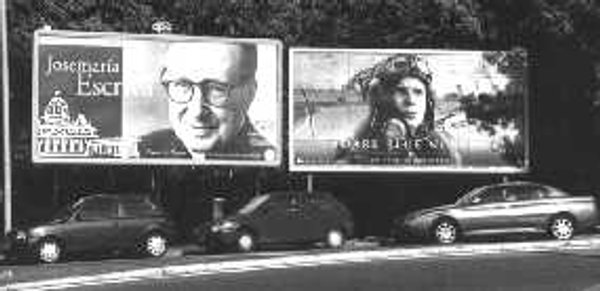All roads lead to Rome; all paths lead to Christ
Since more than 300,000 pilgrims from all over the world were expected to attend the canonization of Blessed Josemaria Escriva in Rome, I did not expect to see anyone I knew there.
Imagine my surprise and delight as my family and I encountered an astonishing number of friends from the Philippines, friends we hadn't seen in years.
Former neighbours of ours in Manila became our neighbours again in Rome; they were staying at the same hotel, a few floors down. Even in Florence, waiting in line at the Galleria dell'Acadamia, we bumped into a former colleague of my father from Southridge, an all-boys school in the Philippines.
During the Oct. 6 ceremony in Piazza San Pietro, I found myself almost shoulder to shoulder with an old friend from Woodrose, our all-girls counterpart of Southridge. No less joyous were our sightings of friends from Vancouver and elsewhere in Canada.
It is so heartwarming to find even just one person from home in a crowd of strangers in a foreign country. To have this happen many times in the space of a few days is a real blessing.
The hundreds of thousands of pilgrims who flocked to Rome that week were immediately identifiable. Many of them were wearing pins, hats, or backpacks with the canonization logo. Their tour buses were adorned with canonization banners.
In every church we visited, there was the ubiquitous group of pilgrims making a visit to the Blessed Sacrament or attending Mass. These people were strangers to me, and yet more than once I found myself exchanging smiles or even a few words with them. We had nothing, and at the same time everything, in common.
All roads do indeed lead to Rome, and for that week at least, it was a city of friends, of brothers.
The sense of solidarity, unity, and brotherhood was most evident during the Oct. 6 canonization. Although in an obviously jubilant mood, the crowds were orderly, reverent, and prayerful. In the hours before the ceremonies started, people cheerfully made room for each other as spaces became increasingly tighter.
They shared their food, water, and even their seats. To pass the time and to prepare for Mass, many prayed the Rosary and also did their spiritual reading and mental prayer, aided of course by one or the other of Blessed Josemaria's books.
Gazing up at the awe-inspiring facade of St. Peter's Basilica while waiting for the Mass to start, I was reminded of one my favourite passages from The Way, Blessed Josemaria's most widely read book, in which he presents a metaphor for the spiritual life:
"Have you seen how that imposing building was built? One brick upon another: thousands, but one by one; and bags of cement, one by one; and blocks of stone, each of them insignificant compared with the massive whole; and beams of steel; and men working, the same hours, day after day.... "Have you seen how that imposing building was built? ... By dint of little things!"
For me, this is the most encouraging aspect of the spirit of Opus Dei: that the seemingly insignificant details of everyday life can be transformed into an immeasurably valuable offering to God, at the same time being the means of our salvation.
With the Mass finally under way, the crowd seemed to hold its collective breath as the Holy Father pronounced the formula for canonization in Latin.
Then the trumpets rang, the choir burst into triumphant Alleluias, and the vast assembly applauded and cheered.
Grinning from ear to ear, I sent silent congratulations to our newly proclaimed saint, whom I had never met, but whose face, voice, and words have become as familiar to me as those of a beloved grandfather's.
I can only imagine the feelings at that moment of those who had been his friends. What a treasure it is indeed to have a contemporary saint whose memory, wisdom, and example can be kept alive and passed on by people who knew him, and knew him well.
One such friend of St. Josemaria was Bishop Javier Echevarria, the present prelate of Opus Dei. Bishop Javier offered a Thanksgiving Mass the day after the canonization, also in Piazza San Pietro. In his homily, he reminded us all that each person, in every profession and circumstance, is called to holiness, and that holiness consists mainly of sanctifying our everyday work, and of sanctifying ourselves and others through our work.
This was the message entrusted by God to St. Josemaria, in all of its beautiful simplicity.
All of us who had made this journey discovered that all roads lead not only to Rome, but most important, to Christ.
The challenge for us now is to walk back along the paths we came, "turning the prose of each day into heroic verse," which is the stuff of which saints' lives are made.
